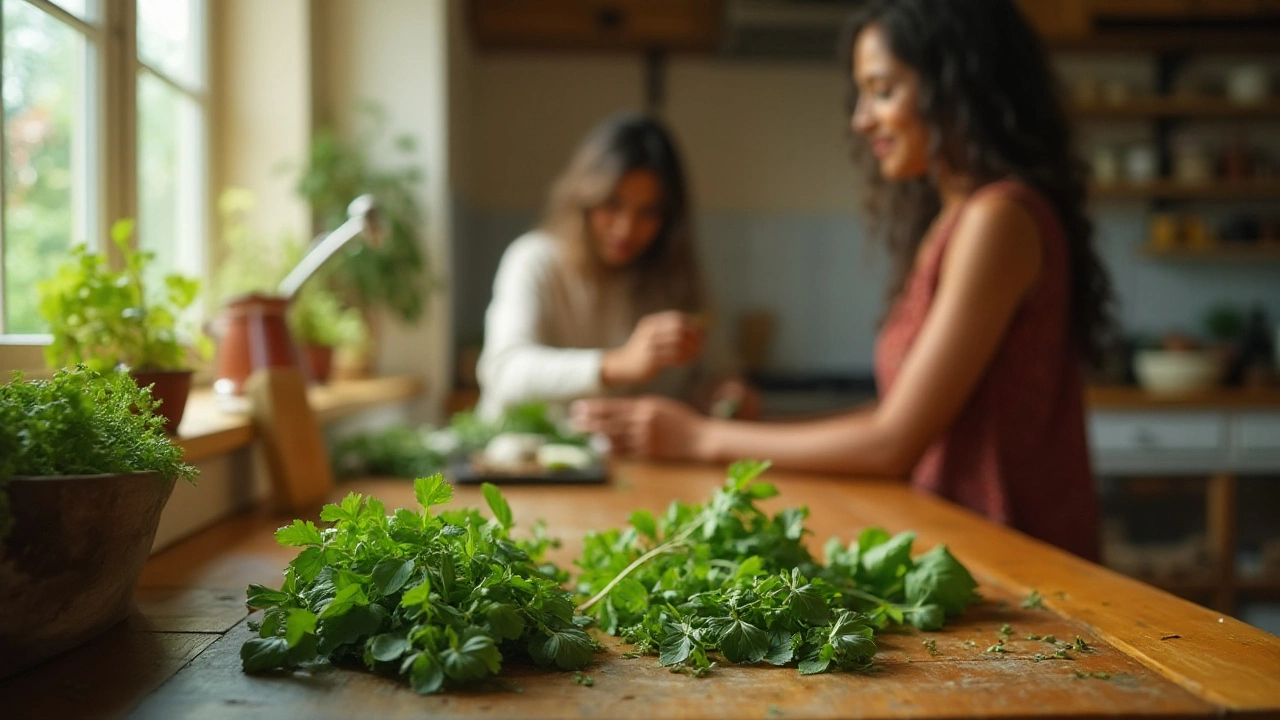
In the world of natural remedies, herbs are often celebrated as nature's gifts for wellness. However, not all combinations of these gifts work harmoniously together. Just as in cooking, where some ingredients simply don't mix, the same applies to herbs. Combining the wrong herbs can lead to undesirable side effects and counteract their intended benefits.
Before diving into the world of herbal supplements, it's crucial to understand how some herbs interact negatively with each other. This can help you make informed choices and ensure your journey to natural health remains a safe and effective one. By knowing what not to mix, you can confidently enjoy the countless benefits nature provides. Let's explore the herbs that are best kept apart and learn how to use them wisely.
- Understanding Herb Interactions
- Common Herbs You Should Keep Separate
- Potential Risks and Side Effects
- Tips for Safe Herbal Usage
Understanding Herb Interactions
When delving into the realm of herbal remedies, it's important to consider the potential interactions that can occur between different herbal supplements. Just like prescription medications or certain foods, herbs can react with one another, leading to unexpected outcomes. These interactions can be synergistic, where two herbs amplify each other's effects, or antagonistic, where one diminishes the other's impact. Hence, understanding these dynamics is crucial for anyone aiming to utilize herbs effectively for therapeutic purposes.
One major reason to be mindful about herb interactions is their bioactive compounds. Each herb contains a unique set of compounds that interact with biological pathways in various ways. For example, the compound coumarin found in some herbal supplements can interfere with blood coagulation, posing a risk when combined with other blood-thinning herbs like ginkgo biloba. Such interactions might not only reduce the efficacy of the herbs but can also lead to serious health issues if left unchecked.
Another consideration is metabolism. Herbs like St. John's Wort can impact the way our bodies metabolize other substances due to their influence on enzymes like CYP3A4. When combined with other herbs that are metabolized through similar pathways, it can lead to increased or decreased levels of active substances in the body, thereby affecting their effectiveness and safety profile. This highlights the importance of thorough research or professional guidance when developing a regime involving multiple herbal supplements.
"Understanding the interactions between herbs isn't just about preventing negative effects; it's also about maximizing their therapeutic potential," says Dr. Jane Doe, a renowned herbalist and author.For those new to herbal supplementation, it might be surprising to learn that even natural products can compete or clash with one another in unexpected ways. For instance, taking sedative and stimulating herbs together, such as valerian root and caffeine-rich herbs, might mitigate each herb's effects, leading to neither the desired sedation nor the expected alertness.
Tips for Assessing Herb Interactions
When considering the use of multiple herbs, a good starting point is to look at traditional medicine texts that have cataloged experiences over centuries. Often, these texts offer insights into safe combinations and those that should be avoided. In modern practice, consulting with a healthcare provider or an experienced herbalist is advisable, especially for individuals with underlying health conditions or those already taking medications. This approach not only provides safety but can also enhance the therapeutic outcomes of herbal use.
Moreover, keeping a journal of your herbal consumption and any noticeable effects can be a beneficial way to track and understand personal interactions. Sometimes, individual physiology can play a significant role in how herbs affect someone, so personal experimentation under supervision may offer personalized insights that general recommendations might not highlight.
In conclusion, the world of herbal remedies is as intricate as it is ancient. By taking the time to understand these herb interactions, users can better harness the potential of herbal supplements for health and wellness while mitigating unnecessary risks. A mindful approach not only respects the power and complexity of nature's remedies but also honors the cultural heritage that has long harnessed these naturally derived substances for healing and well-being.

Common Herbs You Should Keep Separate
When exploring the benefits of herbal supplements, understanding which herbs should not be mixed is crucial to maintaining good health. Everybody loves a good herbal concoction, but mixing the wrong ones can quickly overshadow any potential benefits. A classic example involves the combination of St. John's Wort and Ginkgo Biloba. Both are popular individual remedies—St. John's Wort for mood and Ginkgo Biloba for cognitive enhancement. However, when paired, they can increase the risk of bleeding, especially if one is on blood-thinning medication. It's as if mixing two melodies that don't harmonize; their combination might result in a chaotic tune instead of a soothing melody.
Subtle Yet Significant: Valerian and Kava Root
Another notable pair is Valerian and Kava Root. Valerian is often used to promote sleep, while Kava is known for its calming effect. Although they seem like the perfect match for relaxation, their combination can be overdosed with sedative effects, which may impair breathing and consciousness. The sedative nature of each can amplify the other's impact on the central nervous system, similar to adding too much spice to a dish, risking an overwhelming sensory experience. Individuals should exercise caution and might want to consult a healthcare professional before considering this herbal symphony.
For those intrigued by enhancing their energy and performance naturally, Ginseng might top the list. Yet, mixing it with other stimulant herbs like Guarana can lead to elevated heart rates and spikes in blood pressure. Both are incredible for energy; nevertheless, together, they can create uncomfortable jitters or anxious feelings. Consider these herbs as pulling forces at a tug-of-war contest, both dragging you towards unwanted restlessness instead of balanced vivacity.
The Counteracting Duo: Echinacea and Immunosuppressants
Echinacea, widely loved for its immune-boosting qualities, could counteract the effectiveness of immunosuppressants. A bit ironic, isn't it? The herb that is meant to bolster your immune defense might just decrease the effectiveness of medications designed to do the opposite. This underscores the importance of informed usage and guidance when navigating the herb world. A trusted herbalist or medical professional can provide the insights needed for safe usage.
"Herbs can be powerful and beneficial when used correctly, but it's essential to respect their potency. Uninformed combinations can easily turn a remedy into a hazard," says Dr. Jane Foster, an expert in integrative medicine.
Understanding these crucial interactions is key to enjoying the advantages of using herbs without any setbacks. Education, attention to detail, and respect for each herb's unique properties ensure a path toward optimal health through natural means. Treat these combinations like a recipe for a gourmet dish—thoughtful pairings result in an exquisite experience, while incompatible ingredients may distress your system.

Potential Risks and Side Effects
Mixing herbs without a deep understanding of their individual and combined effects can pose serious health risks. One of the primary concerns is the unpredictable nature of how these natural compounds interact with each other. For instance, combining herbs with sedative properties, like valerian and kava, might amplify their effects and lead to excessive drowsiness or decreased alertness. This can be particularly dangerous for individuals who need to operate machinery or drive. Another well-documented example is the interaction between St. John's Wort and certain antidepressants. This can cause a serious condition known as serotonin syndrome, characterized by confusion, increased heart rate, and severe anxiety. Such interactions highlight the importance of understanding these mixtures before consumption.
Beyond the unexpected enhancement of effects, some herbal supplements might counteract each other's benefits. For instance, taking ginseng alongside anticoagulant herbs like garlic or ginger may reduce the blood-thinning effects, thereby nullifying their potential benefits. Knowing which herbs have similar pathways is crucial for ensuring they don't cancel each other out. It's also critical to pay attention to the dosage, as even safe combinations can become risky at higher intakes. Overdosing on herbs like licorice, which contains glycyrrhizin, can lead to dangerously high blood pressure and reduced potassium levels. Despite being natural, these substances can affect the body's delicate balance.
A deeper understanding of these risks is vital for safe herbal usage. Dr. Mary Hardy, a respected integrative medicine practitioner, once stated,
"Herbs can be as potent as prescription medications. It's essential to handle them with the same caution you'd apply to pharmaceuticals."This reinforces the idea that a 'natural' label doesn't guarantee safety. It's key to remember that the effects can vary significantly depending on an individual's unique physiology and pre-existing medical conditions. For people with chronic health issues or those on prescribed medications, seeking guidance from a qualified healthcare provider should always precede experimenting with herbal combinations.
In the context of side effects, gastrointestinal issues are among the most common problems. Some herbs, when used together inappropriately, can cause nausea, cramping, or diarrhea. This might not seem severe, but it can lead to dehydration or nutrient loss over time. Skin reactions like rashes or itchy patches are also worth noting, as they might indicate an allergic response to combined herbal substances. Finally, if you notice symptoms such as dizziness, difficulty breathing, or swelling after consuming certain herbs, it's crucial to seek medical attention immediately. This could signify a more severe interaction that needs prompt intervention.

Tips for Safe Herbal Usage
When diving into the world of natural herbs and herbal supplements, safety should be your highest priority. While the allure of using nature's pharmacy is strong, it's important to navigate this path with careful attention and knowledge. Start by researching each herb in detail, understanding its individual properties and traditional uses. Not all herbs complement each other, and some combinations can lead to unexpected interactions.
One of the best practices for ensuring safe herb use is to consult with healthcare professionals before beginning any new herbal regimen. Herbal practitioners or even your regular doctor can provide insights into potential interactions, especially if you have existing health conditions or you're taking other medications. Always check if a herb might interfere with your current prescriptions, as some herbs can enhance or diminish their effects.
Start Slow and Monitor Effects
For those new to herbal supplementation, it's wise to start slow. Begin with one herb at a time, giving your body a chance to adjust. Pay attention to how you feel after taking the herb over a span of days or even weeks. Document any changes in your body, energy levels, or mood, as this can help pinpoint the effects of the herb. Remember that herbal remedies often work more subtly and slowly than synthetic drugs, requiring patience as they weave their benefits into your system.
"Herbal remedies have been used since ancient times, but that doesn’t mean they are free from interaction risks," advises Dr. Andrew Weil, an integrative medicine expert. "Understanding herbs is as critical as understanding pharmaceuticals."
Know Which Herbs to Avoid Mixing
It’s crucial to respect the unique chemistry of each herb. Certain herbs should not be mixed because of their synergistic effects. For example, Ginkgo biloba, beloved for its cognitive benefits, should not be combined with other blood thinners due to increased bleeding risks. Keep a personal list of such contraindications and always update it as you learn more.
Practice caution when trying new combinations on your own. Information on safe combinations is often derived from traditional herbal texts and modern research; always look for evidence-based resources. Community forums can be helpful, but take non-expert advice with a grain of salt. Prioritize well-documented interactions and seek advice from professionals who stay current with ongoing herbal studies.
Understand Dosages and Quality
The quality of herbs matters significantly, as variations in soil and climate can affect their composition. Always buy from reputable sources that test their products for purity and potency. The dosage is another area where many go astray. More isn't always better. Following the recommended dosages on packaging or advice from a health professional is key to safe and effective use. Too much of an herb can lead to toxicity, while too little may not provide desired benefits.
In conclusion, while exploring herbal supplements, arm yourself with knowledge. Respect the natural power of herbs and exercise due diligence in your approach to integrate them into your lifestyle safely. Consider these tips not just as starting points, but as guiding principles throughout your herbal journey.







